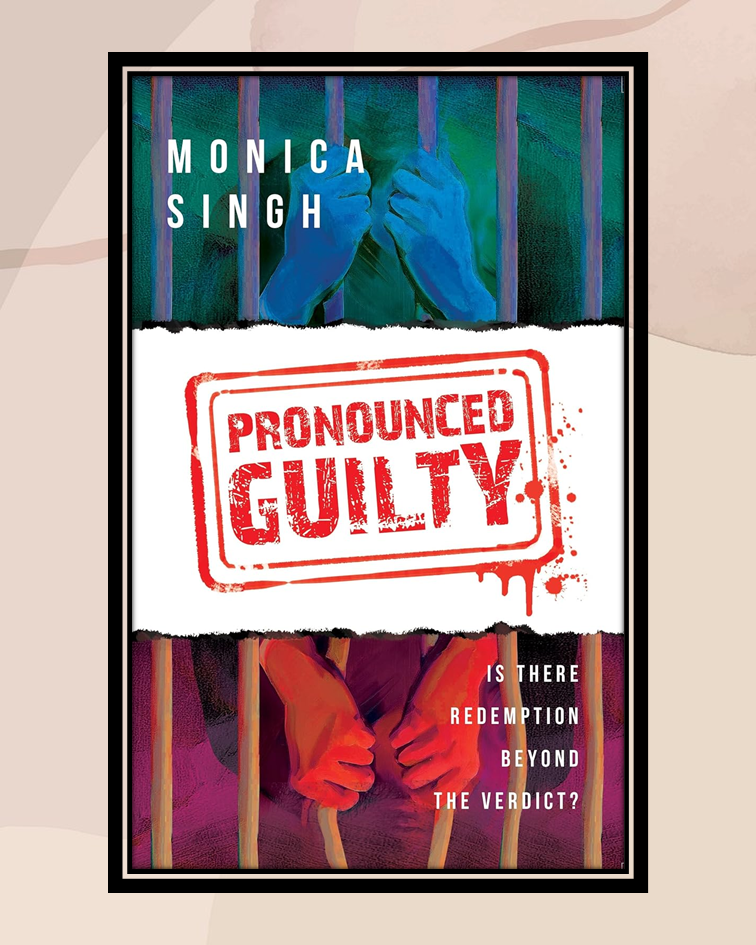Sameer Gudhate presents the Book Review of Pronounced Guilty by Monica Singh
- Sameer Gudhate
- Aug 24, 2025
- 4 min read

You know that moment when you close a book and just…sit there, staring into nothing, because your mind hasn’t caught up with your heart? That was me with Pronounced Guilty by Monica Singh. I’d picked it up expecting a courtroom drama of sorts, maybe something legal-thriller-ish, but what I got was much more layered, much more unsettling—and, honestly, much more human.
The premise itself hooked me. Imagine India’s first open prison—Bandi Mukti Morcha—where life-term convicts are given not just beds and bars but something rarer: a chance to heal, to redefine themselves. At the centre of this radical experiment is Dushyant Dave, a lawyer burnt out by the hollowness of the system, carrying his own grief; Vijender Singh, an ex-convict with sincerity in his bones but society’s suspicion shadowing him everywhere; and Dr. Anusuya Savarkar, a psychologist whose professional calm masks deep personal loss. Three people, each fractured in different ways, trying to build something whole. Doesn’t it already feel like a tinderbox waiting to spark?
What struck me immediately was Singh’s writing style. It isn’t lush in the ornamental sense, nor clipped to the bone—it sits in that sweet spot where every line moves the story while still giving you time to breathe. The prose flows with a measured rhythm, picking up urgency when conflicts flare, slowing down when emotions need space. And the dialogue? Crisp, believable, sometimes achingly raw. It reminded me of listening to real people rather than reading words on a page.
But let’s talk about the characters, because that’s where the book truly blooms. Dushyant, with his sharp intellect dulled by personal tragedy, could have easily been a cliché “fallen hero.” Instead, Singh lets us see him stumble, rebuild, and resist the temptation to give up altogether. Vijender is, to me, the soul of the novel—a man forever branded by his past, who still insists on carving a future, not just for himself but for others. And Anusuya…oh, Anusuya. She might be my favourite. Watching her navigate grief while daring to extend compassion to society’s “discarded” was quietly devastating and oddly uplifting at the same time.
The plot unfolds in a way that feels almost like waves hitting a shore—steady, then surging, then receding to let you absorb what just happened. Singh doesn’t rely on shock twists for drama; instead, she builds tension through moral dilemmas, betrayals, and the heavy weight of secrets. By the time the program itself starts to wobble under pressure—from resistant inmates, political meddling, and the ghosts of the trio’s pasts—you’re not just reading a story, you’re living inside their fragile hope.
And here’s where the themes hit home. Pronounced Guilty isn’t really about crime or punishment—it’s about what comes after. It nudges you (sometimes gently, sometimes forcefully) to confront the labels we slap on people: guilty, criminal, untouchable. It asks the uncomfortable question—what if a mistake, even a grave one, doesn’t have to be the end of someone’s story? As I read, I couldn’t help but think about our own world, where we’re quick to cancel, to ostracize, to write someone off. Singh isn’t naïve—she never suggests crime should go unpunished—but she argues for second chances, for seeing people as humans first.
I’ll be honest: there were moments where the pacing sagged just a little, especially in sections heavy with philosophical musing. But even then, I found myself underlining sentences because they sparked something in me. It’s almost as if the author wanted me to pause there, to wrestle with the question before moving on.
For me, the emotional punch came in the quieter scenes rather than the confrontations—the stolen moments where pain slipped through the armor, where hope flickered in spite of everything. There’s one exchange (I won’t spoil it) that left me staring out of my window at midnight, thinking about forgiveness in my own life. And let’s just say sleep wasn’t happening that night.
If you’re someone who needs your fiction to thrill in a “can’t-turn-the-pages-fast-enough” way, this might feel slower. But if you want a story that lingers, that asks big questions without pretending there are easy answers, Pronounced Guilty is worth every second. For fans of literary fiction that brushes against social commentary—think Khaled Hosseini or Arundhati Roy—you’ll feel at home here.
Closing the book, I kept circling back to the title itself. Pronounced Guilty. It made me wonder—aren’t we all, in some way, sentenced by our mistakes, by others’ judgments, by the harshness of our own inner voices? And if so, don’t we all crave, even deserve, a chance at redemption?
For me, this was a 4.5/5 read—powerful, thoughtful, a little heavy in places, but deeply rewarding. More than a novel, it felt like a mirror held up to our collective conscience. And here’s my final confession: I don’t think I’m done with this story yet. Some books you finish. Others, like this one, finish you—and then quietly begin again inside you.
#PronouncedGuilty #MonicaSingh #BookReview #IndianAuthor #IndianLiterature #FictionWithPurpose #BookstagramIndia #ReadersOfIndia #LiteraryFiction #StoriesOfRedemption #SecondChances #BooksThatMatter #JusticeAndRedemption #ThoughtProvokingReads #ReadersCommunity #MustReadBooks #ContemporaryIndianFiction #BooksOfInstagram #ReadingJourney #PowerOfStories #sameergudhate #thebookreviewman




Comments